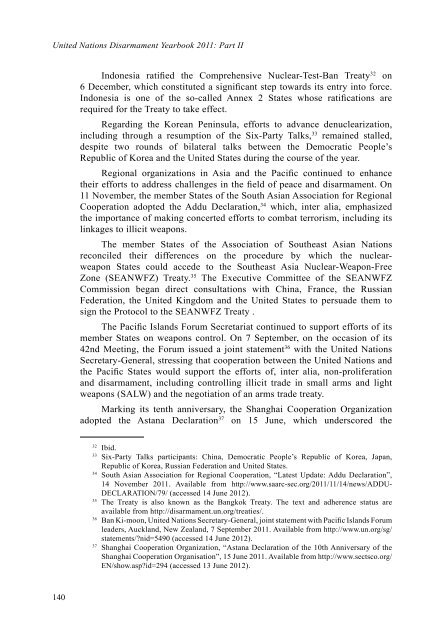DYB2011-Part-II-web
DYB2011-Part-II-web
DYB2011-Part-II-web
Create successful ePaper yourself
Turn your PDF publications into a flip-book with our unique Google optimized e-Paper software.
United Nations Disarmament Yearbook 2011: <strong>Part</strong> <strong>II</strong><br />
140<br />
Indonesia ratified the Comprehensive Nuclear-Test-Ban Treaty32 on<br />
6 December, which constituted a significant step towards its entry into force.<br />
Indonesia is one of the so-called Annex 2 States whose ratifications are<br />
required for the Treaty to take effect.<br />
Regarding the Korean Peninsula, efforts to advance denuclearization,<br />
including through a resumption of the Six-<strong>Part</strong>y Talks, 33 remained stalled,<br />
despite two rounds of bilateral talks between the Democratic People’s<br />
Republic of Korea and the United States during the course of the year.<br />
Regional organizations in Asia and the Pacific continued to enhance<br />
their efforts to address challenges in the field of peace and disarmament. On<br />
11 November, the member States of the South Asian Association for Regional<br />
Cooperation adopted the Addu Declaration, 34 which, inter alia, emphasized<br />
the importance of making concerted efforts to combat terrorism, including its<br />
linkages to illicit weapons.<br />
The member States of the Association of Southeast Asian Nations<br />
reconciled their differences on the procedure by which the nuclearweapon<br />
States could accede to the Southeast Asia Nuclear-Weapon-Free<br />
Zone (SEANWFZ) Treaty. 35 The Executive Committee of the SEANWFZ<br />
Commission began direct consultations with China, France, the Russian<br />
Federation, the United Kingdom and the United States to persuade them to<br />
sign the Protocol to the SEANWFZ Treaty .<br />
The Pacific Islands Forum Secretariat continued to support efforts of its<br />
member States on weapons control. On 7 September, on the occasion of its<br />
42nd Meeting, the Forum issued a joint statement36 with the United Nations<br />
Secretary-General, stressing that cooperation between the United Nations and<br />
the Pacific States would support the efforts of, inter alia, non-proliferation<br />
and disarmament, including controlling illicit trade in small arms and light<br />
weapons (SALW) and the negotiation of an arms trade treaty.<br />
Marking its tenth anniversary, the Shanghai Cooperation Organization<br />
adopted the Astana Declaration37 on 15 June, which underscored the<br />
32 Ibid.<br />
33 Six-<strong>Part</strong>y Talks participants: China, Democratic People’s Republic of Korea, Japan,<br />
Republic of Korea, Russian Federation and United States.<br />
34 South Asian Association for Regional Cooperation, “Latest Update: Addu Declaration”,<br />
14 November 2011. Available from http://www.saarc-sec.org/2011/11/14/news/ADDU-<br />
DECLARATION/79/ (accessed 14 June 2012).<br />
35 The Treaty is also known as the Bangkok Treaty. The text and adherence status are<br />
available from http://disarmament.un.org/treaties/.<br />
36 Ban Ki-moon, United Nations Secretary-General, joint statement with Pacific Islands Forum<br />
leaders, Auckland, New Zealand, 7 September 2011. Available from http://www.un.org/sg/<br />
statements/?nid=5490 (accessed 14 June 2012).<br />
37 Shanghai Cooperation Organization, “Astana Declaration of the 10th Anniversary of the<br />
Shanghai Cooperation Organisation”, 15 June 2011. Available from http://www.sectsco.org/<br />
EN/show.asp?id=294 (accessed 13 June 2012).


